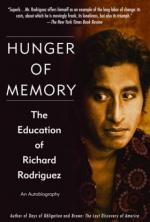|
This section contains 6,729 words (approx. 23 pages at 300 words per page) |

|
SOURCE: Fine, Laura. “Claiming Personas and Rejecting Other-Imposed Identities: Self-Writing as Self-Righting in the Autobiographies of Richard Rodriguez.” Biography 19, no. 2 (spring 1996): 119–36.
In the following essay, Fine examines the development of Rodriguez's cultural perceptions throughout his two autobiographies.
Hunger of Memory: The Education of Richard Rodriguez garnered both fiercely positive and negative reviews at the time of its publication in 1982. Heralded by the right-wing establishment as a model ethnic writer for his stands against bilingual education and affirmative action, Rodriguez found himself excoriated by the academic left, and by Latino critics who felt he had betrayed his ethnic community.1 Indeed, in a recent article, Chicano writer Ruben Martinez labels Rodriguez “the Mexican-American Chicanos love to hate” (18). Although the book carefully mixes personal narrative and political exposition, critics overwhelmingly concerned themselves with simply the latter. In dismissing the complexity of both Hunger and his second autobiography, Days of Obligation: An...
|
This section contains 6,729 words (approx. 23 pages at 300 words per page) |

|


